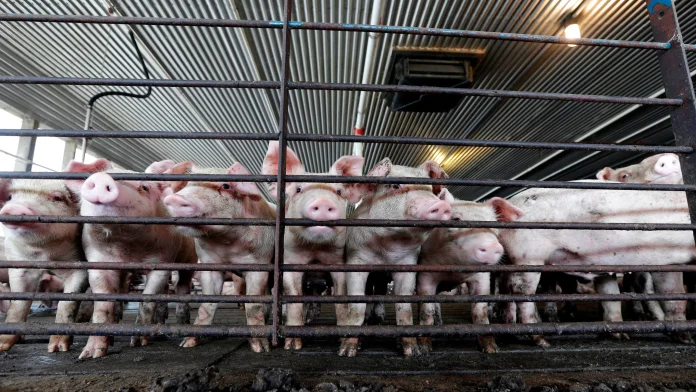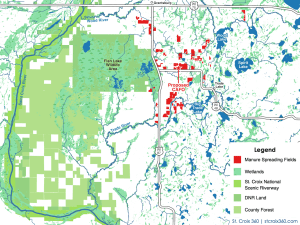

By reducing number of animals and increasing cage size, Cumberland says it will comply with new standards.
Cumberland LLC, the company seeking to open a swine operation in northwestern Wisconsin, has filed a new preliminary application for a state permit. Company representative Jeff Sauer wrote to the DNR last week that they have “reconsidered” their plans, and will reduce the number of animals the facility will house, providing more space for hogs in compliance with a new California law.
The company has twice applied for and failed to receive permits for a major new operation in Burnett County. Its most recent application was rejected by the DNR in March for having incomplete information about where it would spread all the manure it produces.
The company now says it will seek to raise 19,800 hogs in the facility, compared to about 26,000 animals in previous applications. Those hogs will produce approximately 5 million gallons of manure per year, about 2 million gallons less than in its earlier proposals. A new corporate entity was also introduced, “Steadfast Farms,” though no details about it were immediately available.
“We at Cumberland LLC / Steadfast Farms believe this will meet the needs of the Protein Market that demands additional space and a more natural method of production,” Sauer wrote. “We feel this gives the community an exciting new opportunity to be involved in producing Protein in a more natural way along with the ability to potentially purchase at local ‘Whole Food Stores’ in the area.”
California’s Proposition 12, passed by voters in 2018, required that all pork sold in the state must comply with space requirements for hogs. Sows must have 24 square feet of living space and be able to stand and turn around in their pens. Challenged by the National Pork Producers trade association, the U.S. Supreme Court upheld the law in a ruling yesterday.
Cumberland LLC also told the DNR it intends to comply with space requirements set by the Global Animal Partnership (GAP), an organization which certifies livestock facilities for meeting specific standards. At its minimum level, GAP requires hogs between 36 and 55 pounds to have at least six square feet of space and hogs between 56 and 112 pounds to have seven square feet. Sows in the process of birthing and raising piglets must have 48 square feet.
The company has not yet submitted detailed plans, including specifying where manure would be applied to farm fields, a key pollution concern. Before its most recent rejection, Cumberland told the DNR it had secured the right to spread manure on about 800 acres of nearby farm fields, but would haul the remainder of its waste to unspecified locations across the St. Croix River in Minnesota.
In a letter acknowledging receipt of the preliminary application, DNR specialist Falon French told the company that state review of the proposal would not begin until a full application is submitted. A Nutrient Management Plan that identifies waste disposal fields is required as part of that application.





